I’m stoked to be writing about the Bonneville Salt Flats for MotorMavens! I’ve been a HUGE fan of the site since it started last year. A super quick intro might be in order, I guess… I’m Chris Hecht, originally from SoCal, now living in Utah. I’m a husband of ten years, father of four boys, Quality Engineer for a medical device manufacturer by day, and car fanatic by… day and night. I live two hours from Lands End – where paved road meets the other planet known as the Bonneville Salt Flats.
I’ve been going to Bonneville’s “Great White Dyno” for three (going on four) years. I was first invited out by my co-worker and friend Dallas Volk (too bad he’s no relation to Volk wheels haha) – but he is a member of the prestigious 200MPH Club. He and his family have been racing a 1929 Ford Roadster his entire life. Dallas, his dad Larry (current President of the 200MPH Club!), brother Patrick and sister Allison (nicknamed “Hollywood”) are all in the 200MPH Club. I’m not, but I have contracted a dreaded disease…
I’ve officially been diagnosed with Salt Fever – and it’s uber contagious. Bonneville has its own culture and feel, just like drifting, time attack or drag racing. There are the old timers and veterans who keep the traditions alive with the new blood learning the ropes while adding their own style, flair and background.
I hope to bring to the MotorMavens readers a view of this motorsport and share the cars and culture that make it what it is today. For this first post, we’ll have a look at some of the import land speed cars I’ve spotted. As you’d guess, the majority of cars built to make top speed runs down the long salt, of course, are American. However, the great part about Bonneville (and El Mirage) is that there are A LOT of classes to run in – many of which are perfect for Japanese and European cars because of their engine selections and aerodynamics.
Check the first picture. This Ferrari (#288) runs in the AA/BGMS class (AA = over 500 cubic inches, Blown (super or turbocharger), Gas Modified Sports). According to SCTA’s site, it went 235mph and there’s a comment on the notes…”Smoke?” Like any motorsport, land speed racing is all about the details. Check the front fenders…aero diffusers (not sure what they call them) to help direct the airflow and add stability. Most of these cars never see a wind tunnel, but the aero tricks are tried and true.
The Dandy FC3S RX7 is a Japanese built racer. This particular car had a Speedweek decal from 1998 as well, so it’s been 11 years since its last attempt at the E/BGT (E = 3.01-4.26 Liters, Blown Gran Turismo) record, which stands at 238.442 MPH, set by the Racing Beat RX-7 back in 1986 – which tells us it’s also an FC3S model that holds the class record. I know Antonio is diggin’ on these fresh gold meshies…Antonio, are these SSR Mesh? I bet you know the size and offset too. *cough*Wheel nerd*cough* LOL!
You probably noticed something about the engine class the 13B is forced to run in, the “E” class, which is 3.01-4.26 liters. I know sometimes people consider the 13B a 2.6 liter, but that’s still short. It must have something to do with the number of combustion cycles, blah blah blah. I think the Rotary engine got robbed. Yet, it still holds the record for the E engine class. Amazing! Don’t let the rotary die, Mazda! The Dandy FC went 213MPH, but it spun like three times. A lot was learned, and I hope they return to run for the record again in 2010. This car was by far the cleanest build there, IMHO. Once again, the Japanese show their skill and attention to detail.
This is one of my favorite Bonneville racers – a Mitsubishi Galant VR4. It holds the record for the class my WRX would compete in, which is the Production Blown Supercharged (G/PS, G = 1.51-2.00 Liter, Production Supercharged). We all know it’s turbocharged, but the B’ville boys are old school and the Production Supercharged class history dates back to the Studebaker Avanti R5 – a 575hp, twin supercharged V8 from 1963 (gotta love the 60s era for muscle cars).
Dig the big shorty downpipe exiting from the front bumper. Nasty! This badboy Mitsu went 224MPH! I need a rulebook to know what’s up with “Production” class, as I know this thing has a built motor, big turbo, etc. Hovever, the body is all production (except for the parachute which is mandatory per the rules and the little aero roof rails/diffusers).
One of the most classic designs of all time – the Volkswagen Karmann Ghia. This V-dub is the record holder in the H/BAGC class (translation? H = 1.01-1.50 Liters, Blown Altered Gas Coupe) also known as H/BALT. I know… the class designations are crazy hard to learn. Check the website links at the bottom – consider it homework. Oh yeah, the Ghia’s record… it’s at 164MPH, using a small early 80s water cooled 1.5L VW engine with a big turbo. Check out the feature story and more photos here.
This car is a perfect example of the different kinds of cars and engine setups that you might see at B’ville. First of all the car. I’m having a hard time figuring out what this is. At first glance, I think Datsun Z; maybe 260Z or 280ZX? But those little red lights and headlight cover bezels are throwing me off. Then the engine…What on earth is that?! Again, my first guess is maybe an airplane engine. It’s a flat design, but it appears to be two cylinders. But it has four spark plug wires, which could be 2 plugs per cylinder? I don’t know, but it’s wicked cool! Either way, whatever it is, it’s wacky, different, cool and fast. Win!
I spotted this Killion Speed Shop Belly Tank Lakester in the tech inspection area. It’s powered by a stout little EJ25 Subaru STi motor, poked and stroked out to 2.8L. It has a big turbo and top mount intercooler setup – good for about 800HP at big boost levels, the owner told me. It’s gone 170-something. It’s running against the F/BGL (F = 2.01-3.0 Liters, Blown Gas Lakester) record, which is at a very attainable 213MPH. It looks like it was recently finished before Speedweek 2009, so they’re probably ironing out the kinks.
Here’s the belly tanker pulling out of tech inspection. Check out the super low, salt scraping stance. This is a very clean build, fresh paint job, complete with the Rat Fink character on the nose. I love that they fit a modern Subaru powerplant in the classic and timeless belly tanker body. Hopefully I get to see the Killions killin’ it at Speedweek this year!
There’s so much to talk about when introducing land speed racing to anybody. I’m not an expert here either, but I’m catching on. I’m heading to Speedweek on August 13th to get my salt fix. Keep an eye out for more Bonneville coverage in the meantime. I’d like to show you guys and gals the more traditional rides too – like the roadsters, more belly tankers and some streamliners and lakesters – the cars that go 300-400 MPH.
:: Chris Hecht
PS: This is your homework reading assignment:
S.C.T.A. Engine Classes
S.C.T.A. Engine and Body Classes
Current Bonneville Land Speed Records

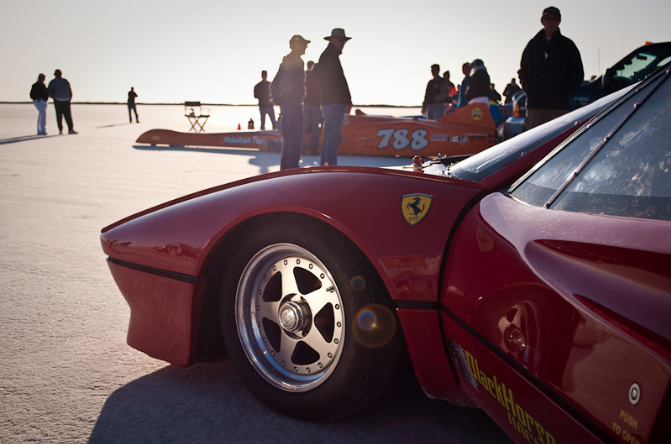
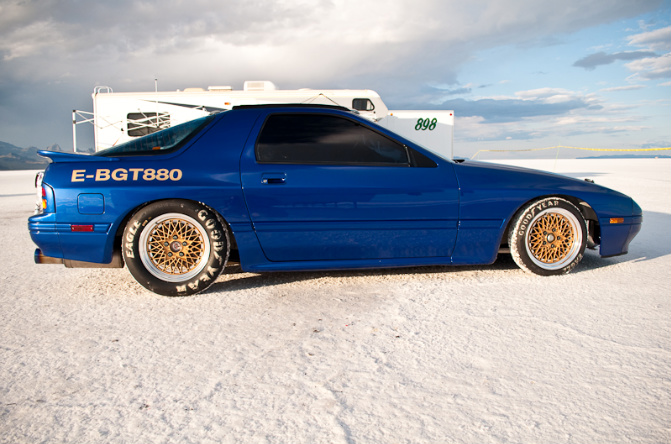
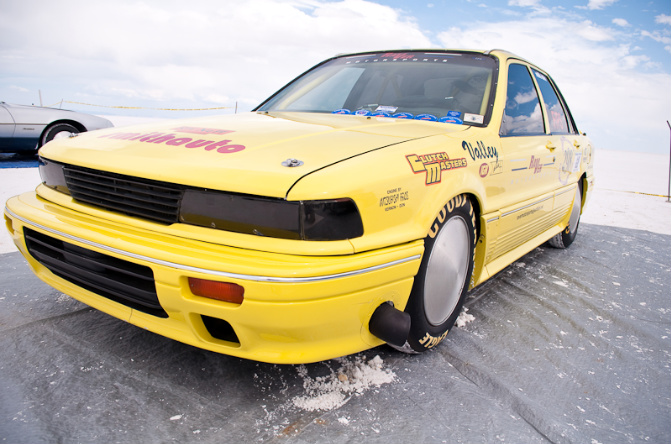
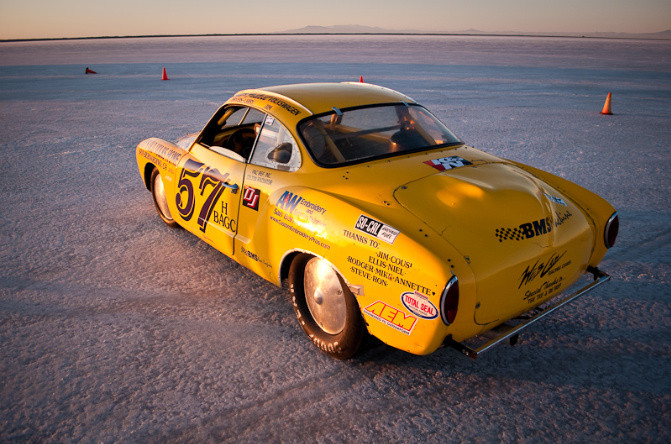
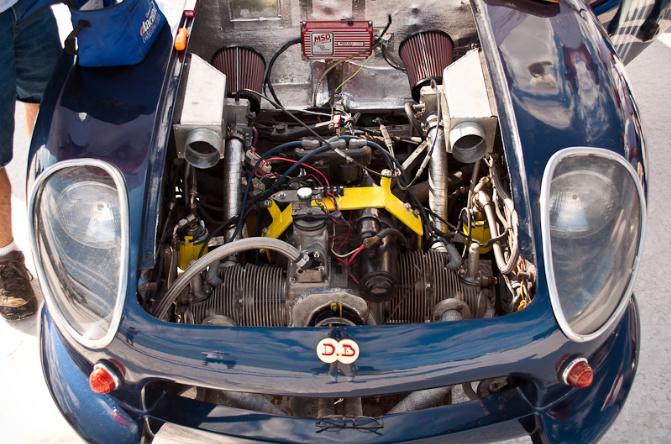
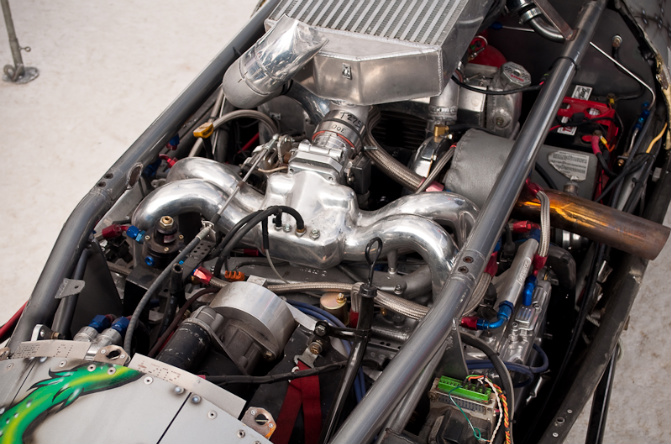
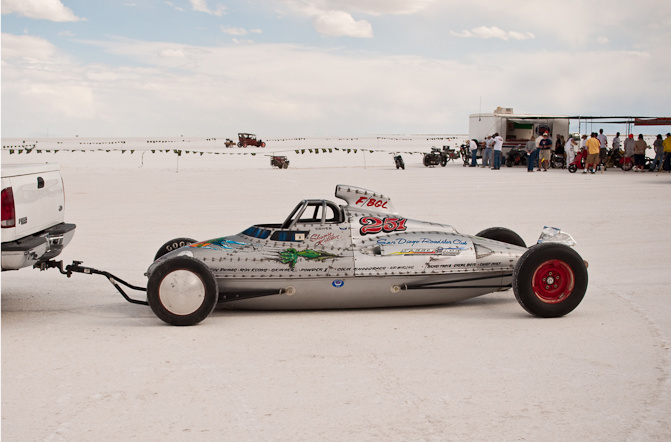
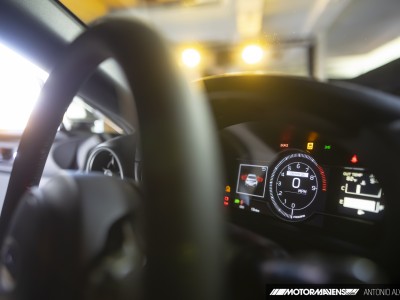
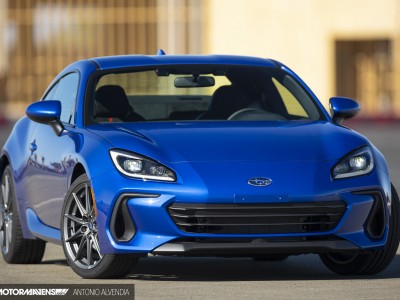





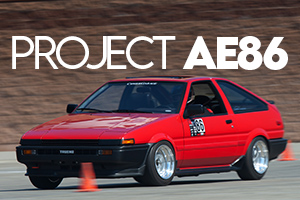



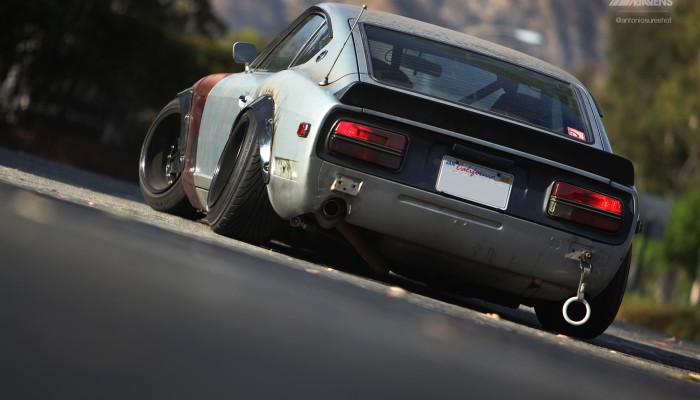
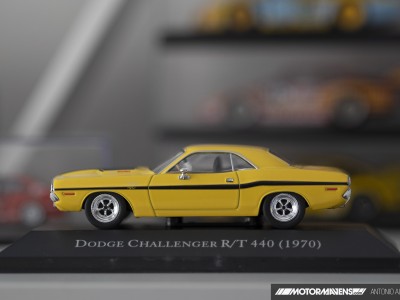

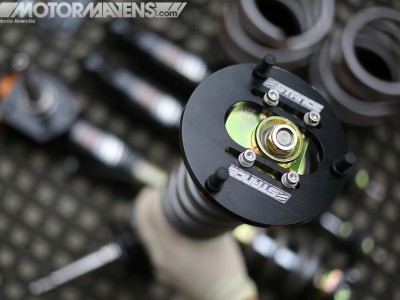
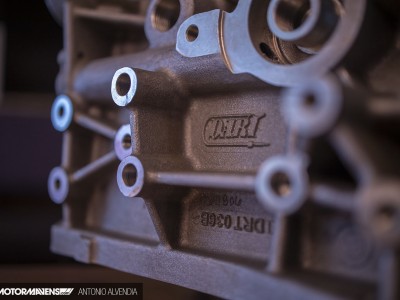
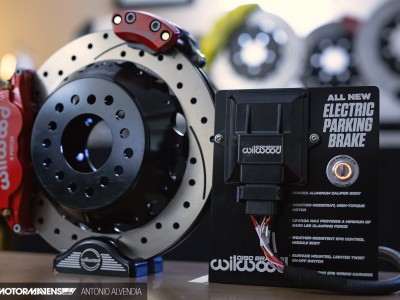
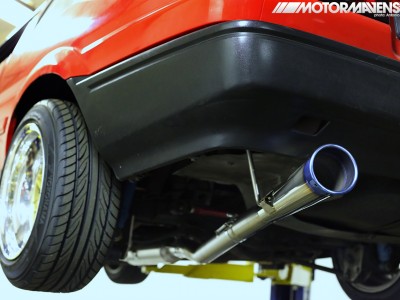
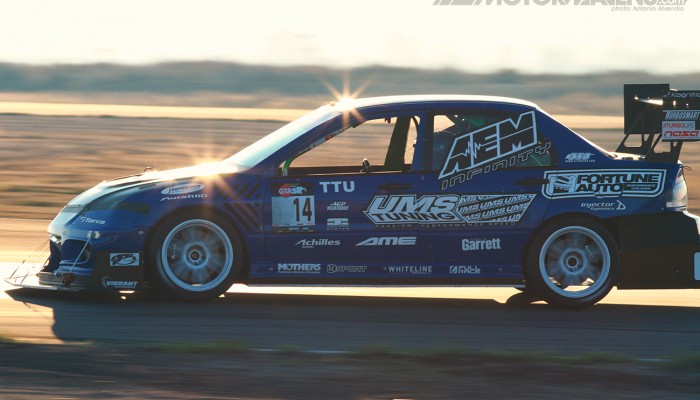

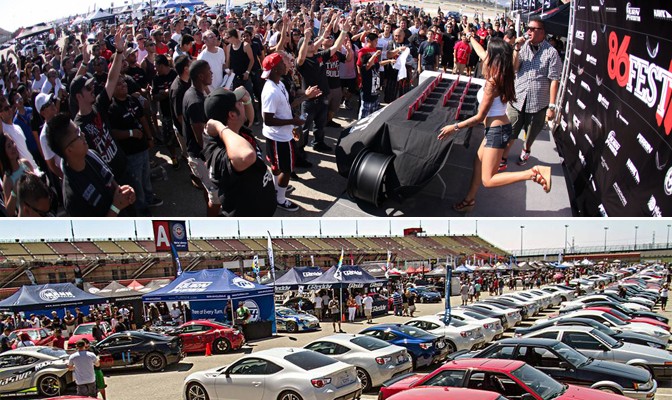
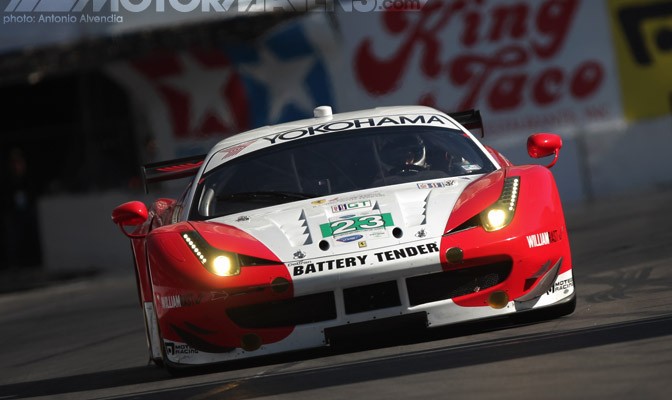
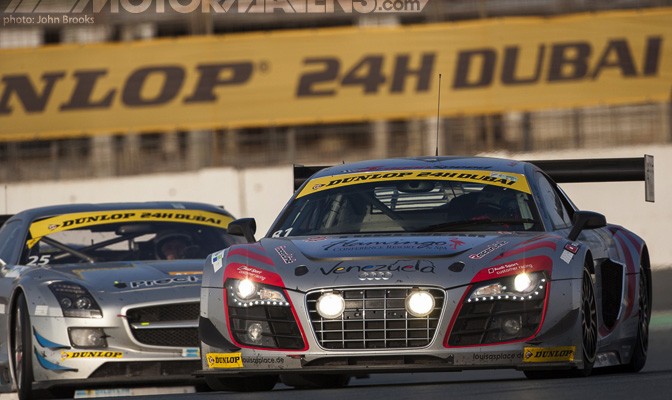



Way to go Hechtspeed! We’ll be scoping out imports and hot rods again this year. I’ll be trying to out-photo you this year!
Thanks Pikesan! B’ville 2010 will be AWESOME!!! Game on holmes!!!
This was a great post, Chris! It’s pretty awesome to see different aspects of car culture, especially as seen through a different set of eyes! I love the shot of the Ferrari, and that FC3S is dope!!!
I wish I could swap out the Ghia for the FC3S in that AWESOME sunset/sunrise photo of the Ghia though! regardless… GREAT photo!
Siiiiccckkk coverage! More Salt Flats racing!
Thanks Antonio. I’m hoping I can get the Dandy FC alone this time.
@Killzone, glad you dig. More coming, Speedweek starts in 16 days!
that Galent is epic Chris.. great job on the story .. and Welcome to motormavens..
Chris I envy you so much. I wish I were that close to the flats. Keep up with coverage from there you already know I love this stuff!!!
I’m really diggin’ the front exhaust on the Galant. That’s friggen badass!! Too bad we can’t do drift cars like that, eh?
So, drift cars aren’t allowed per rules to have a shorty downpipe exit out the front eh? bummer!
My uncle things that dark blue racer with the flat aircooled engine is a XKE Jaguar from the 60’s. Could be a good guess.
Chris
No, not so much that it’s a rule…but I imagine that it’s preettttyyy loud. Which is great when you’re out on the salt flats….or doing 10 second pulls in a straight line right? Not quite as practical for a car going around a regular track multiple laps at a time, maybe? Great possibility of deafening on-track media personnel as well? Regardless, it’s friggen cool and I will strive to see it done one day! 😛 Cool article too! Can’t wait to see more coming from the Salt Flats!!
Definitely agree with the Dan… I WANT TO GO TO BONNEVILLE! NEXT YEAR!!!!!!!!!!!!
@Antonio…aha! Feeling a little fever are you? Salt Fevaaaaaaaaaaaaaaah! I need to put together another post with more traditional rods and racers. Here’s some names of the ‘liners and lakesters: “Got Salt”, “Saline Solution”, “Nebulous Theorem”, “Old Crow”, “Just Glad to be Here”, “Bonner’s Bad Berkeley”…
Great write up Chris, I’d love to get out to the salt flats and see these cars run, and use the opportunity to take some photos. Maybe if I win the Lotto I’ll be able to make it over there one day!
Pingback : Modify It @ MALTA 2009 Part 5 – 10 | BoyRacers Online
I would love to go out and see these cars run! It would be so awesome to see all these import cars in person.
What a hunk of shit
Wow… there are some great cars! Maybe not the imports but everything else ^^
Dandy FC3S RX7!!!
RX7!!!!!!!!!!!!!!!!
aside from being the coolest car in Initial D, and my personal favorite…that FC is fixed hella nice!
i’d love to take a spin in that @ bonneville…hell i’d race that thing anywhere
@ crazy frasian: obviously the hachi roku is the best ride in initial D….i think that car is the WHOLE point behind initial D…
just saying…
no, the whole point behind initial D is to prove that drifting is a legitimately applicable form of racing, esp in touges …car is irrelevant-it’s all about the driver and their technique
just sayin 😛
drifting is NOT the fastest way around a corner–any seasoned racing veteran will tell you that, which is why it’s not commonly used in time-attack races & hill climbs e.g. pike’s peak
and while the individual driver is important, im sure we can all agree that the story line of initial D revolves around “the eight-six”
Nice to see the FC3S giving it a go….looks like the power isnt the problem, its aerodynamics and high center.
the blue car is a Deutsch-Bonnet HBR5; a rare bird, it has a flat twin (750-900cc), and this block seems to have very different heads and fins. i’d go for a purpose built special…